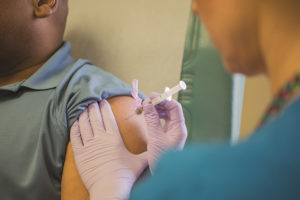Hundreds of millions of vaccine doses will require hundreds of millions of syringes from companies such as BD.

CEO Thomas Polen said in an early November earnings call that the demand for syringes and needles to deliver vaccine represented a $100 million to $150 million opportunity through 2021.
Over the summer, HHS’s Biomedical Advanced Research and Development Authority (BARDA) covered more than half of the $70 million in costs for BD to expand syringe and needle production in Nebraska. The company recently announced $1.2 billion to expand and upgrade multiple drug-delivery facilities to support the expected transition to pre-fillable syringes for COVID-19 vaccines.
“Drug-delivery devices are really the foundation of our company, and we have a long history in supporting global immunization campaigns,” Elizabeth Woody, BD’s SVP of public affairs, explained to Drug Delivery Business News. (Listen to the interview in our final DeviceTalks Weekly podcast of 2020 — out in the coming days.)
The stakes couldn’t be higher as global deaths from the coronavirus pandemic reach millions.
Here are four insights from Woody on how BD is tackling the challenge:
1. Ramping up needle and syringe production takes time.
The process of setting up additional manufacturing lines in Nebraska, announced a few months ago, is a 9- to 12-month process, according to Woody.
“You need the equipment to establish the lines,” she said. “Fortunately, we have the space in Nebraska. We’re not needing to build a new facility, but there is a lot of engineering behind a plastic-molded syringe and the needle on the end that may not seem obvious. … It is a pretty intense engineering feat to deliver those products, particularly at the scale that we do.”
For now, BD has to use its current global manufacturing infrastructure in order to meet demand.
2. Manufacturing syringes isn’t as straightforward as one might think.
Syringes have been a prime vehicle for delivering drugs and drawing blood since the 19th century, but manufacturing them can still be demanding.
“In the state of Nebraska, where we manufacture a number of these products, we’re actually one of the largest consumers of energy — because the process of actually molding the syringe is so energy-intensive,” Woody said.
The manufacturing process starts with the heating of plastic pellets called resin, which are melted and injected into molds to create syringe parts including the barrel and plunger rod. BD creates the plastic parts of a needle — the hub and shield — the same way.
To produce the needle, a stainless-steel strip is rolled into a tube and welded. A metalworking process called drawing shrinks the tube to the proper wall thickness and gauge and then cuts to length. The blunt metal tubes, or cannula, then go through a grinding process to form the sharpened point.
Everything then gets fed through high-speed assembly and packaging machines. Case cartons with the individual units are sterilized on-site before they’re stacked onto pallets and shipped out via trucks.
BD quality engineers oversee the entire process to ensure that strict safety standards and specifications are met.
“We know we know how to manufacture needles and syringes. We’ve been doing it for a long time and we’ve really perfected the process. We’re confident in the volumes that we’ve committed to, based on that long track record,” Woody said.
3. BD learned lessons from 2009
The 2009 swine flu pandemic, caused by a new strain of H1N1 virus, proved to be a dry run for BD in supporting vaccination efforts. It drummed home the need for early planning and preparation — and to work with governments around the world to pre-position supplies of syringes and needles so that a vaccine can be administered once it’s available.
Even as BD ramps up production to ensure devices are in place to deliver COVID-19 vaccines, it must also continue supporting flu shots and child immunizations.
“We learned a lot of lessons from that experience that we’re definitely applying now,” Woody said. “We didn’t know then that we were preparing for coronavirus, but we did know that we needed to take some more steps to be prepared for a full-fledged pandemic like the one we find ourselves in now.”
4. Making sure there are enough syringes wherever vaccine shipments go
BD’s supply team members are making sure that the syringes for COVID-19 vaccine are going to distribution centers set up by McKesson, which the U.S. government chose as its COVID-19 vaccine distributor partner.
“They’re preparing the kits that they’re then sending out,” Woody said.
Syringes and needles are just two of many areas where BD has been contributing toward the management of COVID-19 pandemic. The company has been an important producer of testing swabs, tools for testing and transport, actual tests for the virus, and machines running the tests.
In July, the company announced the U.S. launch of a SARS-CoV2 antigen test for use with the BD Veritor Plus system, following an FDA emergency use authorization. Health Canada authorized the test in November, pledging to buy $7.6 million of them.
“From a work perspective, it is just energizing to know that we’re part of something bigger here, and we’re committed to making that difference,” Woody said.

